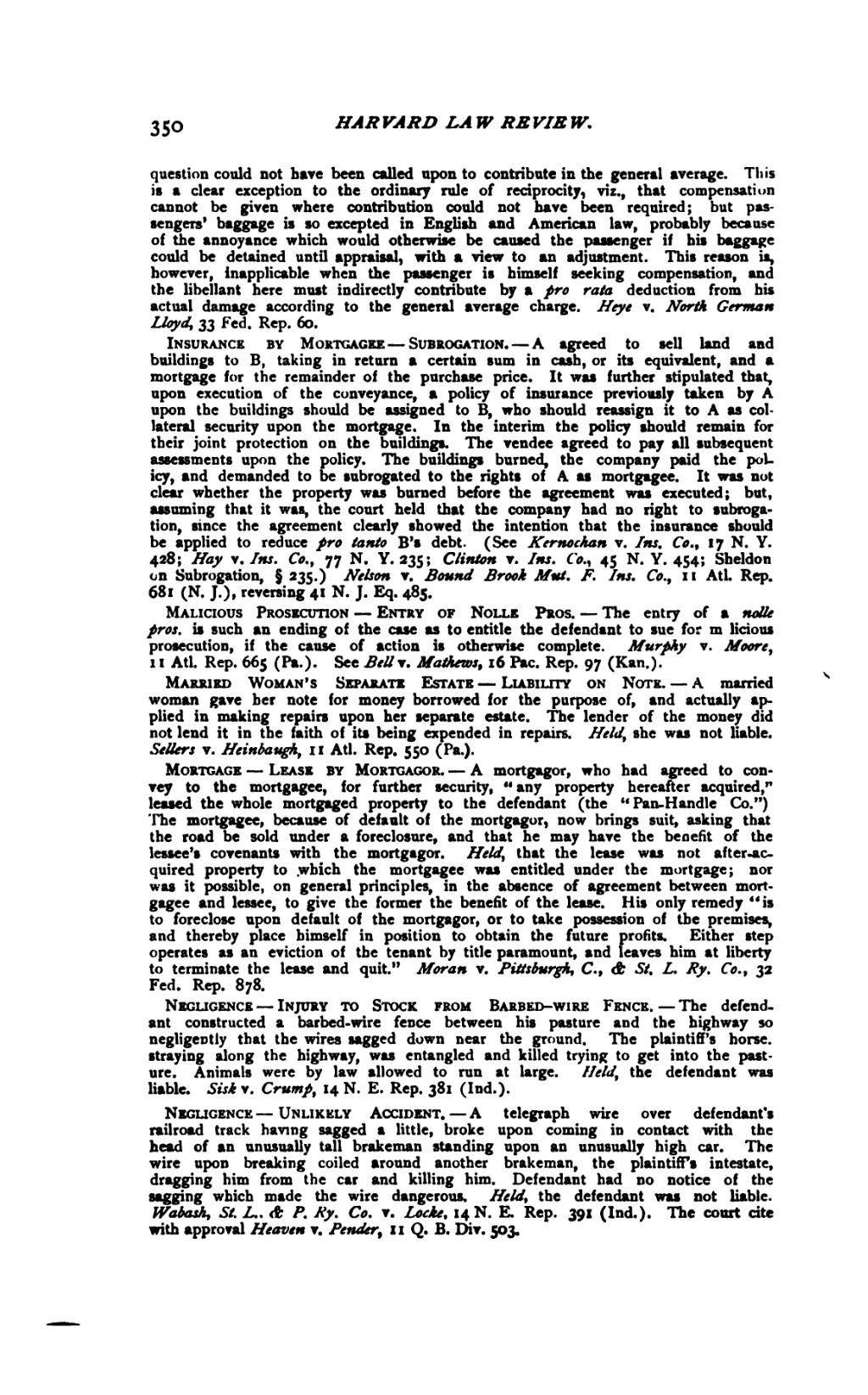question could not have been called upon to contribute in the general average. This is a clear exception to the ordinary rule of reciprocity, viz., that compensation cannot be given where contribution could not have been required; but passengers’ baggage is so excepted in English and American law, probably because of the annoyance which would otherwise be caused the passenger if his baggage could be detained until appraisal, with a view to an adjustment. This reason is, however, inapplicable when the passenger is himself seeking compensation, and the libellant here must indirectly contribute by a pro rata deduction from his actual damage according to the general average charge. Heye v. North German Lloyd, 33 Fed. Rep. 60.
Insurance by Mortgagee—Subrogation.—A agreed to sell land and buildings to B, taking in return a certain sum in cash, or its equivalent, and a mortgage for the remainder of the purchase price. It was further stipulated that, upon execution of the conveyance, a policy of insurance previously taken by A upon the buildings should be assigned to B, who should reassign it to A as collateral security upon the mortgage. In the interim the policy should remain for their joint protection on the buildings. The vendee agreed to pay all subsequent assessments upon the policy. The buildings burned, the company paid the policy, and demanded to be subrogated to the rights of A as mortgagee. It was not clear whether the property was burned before the agreement was executed; but, assuming that it was, the court held that the company had no right to subrogation, since the agreement clearly showed the intention that the insurance should be applied to reduce pro tanto B’s debt. (See Kernochan v. Ins. Co., 17 N. Y. 428; Hay v. Ins. Co., 77 N. Y. 235; Clinton v. Ins. Co., 45 N. Y. 454; Sheldon on Subrogation, § 235.) Nelson v. Bound Brook Mut. F. Ins. Co., 11 Atl. Rep. 681 (N. J.), reversing 41 N. J. Eq. 485.
Malicious Prosecution—Entry of Nolle Pros.—The entry of a nolle pros. is such an ending of the case as to entitle the defendant to sue for malicious prosecution, if the cause of action is otherwise complete. Murphy v. Moore, ll Atl. Rep. 665 (Pa.). See Bell v. Mathews, 16 Pac. Rep. 97 (Kan.).
Married Woman’s Separate Estate—Liability on Note.—A married woman gave her note for money borrowed for the purpose of, and actually applied in making repairs upon her separate estate. The lender of the money did not lend it in the faith of its being expended in repairs. Held, she was not liable. Sellers v. Heinbaugh, 11 Atl. Rep. 550 (Pa.).
Mortgage—Lease by Mortgagor.—A mortgagor, who had agreed to convey to the mortgagee, for further security, “any property hereafter acquired,” leased the whole mortgaged property to the defendant (the “Pan-Handle Co.”). The mortgagee, because of default of the mortgagor, now brings suit, asking that the road be sold under a foreclosure, and that he may have the benefit of the lessee’s covenants with the mortgagor. Held, that the lease was not after-acquired property to which the mortgagee was entitled under the mortgage; nor was it possible, on general principles, in the absence of agreement between mortgagee and lessee, to give the former the benefit of the lease. His only remedy “is to foreclose upon default of the mortgagor, or to take possession of the premises, and thereby place himself in position to obtain the future profits. Either step operates as an eviction of the tenant by title paramount, and leaves him at liberty to terminate the lease and quit.” Moran v. Pittsburgh, C., & St. L. Ry. Co., 32 Fed. Rep. 878.
Negligence—Injury to Stock from Barbed-Wire Fence.—The defendant constructed a barbed-wire fence between his pasture and the highway so negligently that the wires sagged down near the ground. The plaintiff’s horse, straying along the highway, was entangled and killed trying to get into the pasture. Animals were by law allowed to run at large. Held, the defendant was liable. Sisk v. Crump, 14 N. E. Rep. 381 (Ind.).
Negligence—Unlikely Accident.—A telegraph wire over defendant’s railroad track having sagged a little, broke upon coming in contact with the head of an unusually tall brakeman standing upon an unusually high car. The wire upon breaking coiled around another brakeman, the plaintiff’s intestate, dragging him from the car and killing him. Defendant had no notice of the sagging which made the wire dangerous. Held, the defendant was not liable. Wabash, St. L. & P. Ry. Co. v. Locke, 14 N. E. Rep. 391 (Ind.). The court cite with approval Heaven v. Pender, 11 Q. B. Div. 503.
